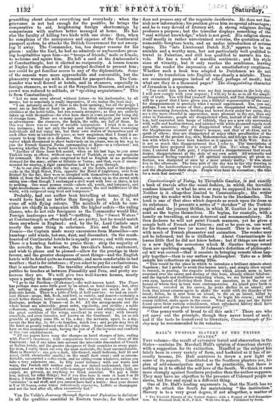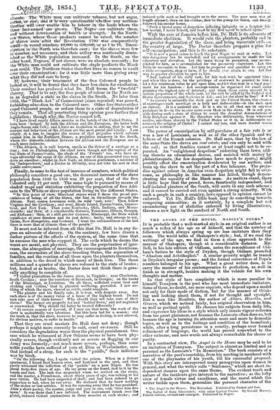HdT,MS ' TWOFOLD SLAVERY OF THE 'UNITED Tills volume—the result of
extensive travel and observation in 'the States—contains Dr. Marshall Hall's opinion of American slavery', with a suggestion' for its extinction. Handled as the sithject has lately been in' every variety Of form, and.hacknied. as it has of ne- cessity become, Dr. Hall contrives to throw a new light on some of its aspects. Constituted as the Southern,' planters are; lies plan of self-emancipation may not -be practicable, but there is nothing in it te offend the -self-love of the South. We think it runs more strongly against Southern prejudice than the author supposes. They may have no- objeetionto the 'presence of.Coloured people ita slaves, but free and equal is a different thing. One of Dr. Hall's leading arguments is, that the North has no right - to attack the South for maintaining "the . institution." Slavery is to a 'Very great 'degree; if not eltorther, A -matter-of The Twofold Slavery of the United States; with 'a Project of Self-BMancipa- tion. By Marshall Hall, M.D., F.R.S. With two Maps. Published by Scott. chnurter-The-White-man tan cultivate-tobacco but met sneur, aateeilikrel fibtit 'Aid iIyl atilMabler %vi*t/itLr any Mini-as tisalienlittillitter=oenalilailiiin labitrrr in the littidt'*here the thket I am' grot frhel•N90-oi. can .etiltiVate themi, andilw3thdtit detdribration- 9f br 'Strength. In the Norths- arrEdittek'Al9relighese' prolittbti .teniittit lie raised, the number of--ridaireiVq6dlit'Aftfdi .thU-ItevbIttiti"11901 litte MitaticirativRy anesittu-in ItotitlfUnkilaleYs .4Ci,000 o650;1300,or wii&theietbi eiity'; for • ihe'irlai•es' tiere few intititiabeiti,119t'n9carirary.,iiiili 'their Utflittyleas ,‘Matintially he White 'population increased. l'Itt the 'South, on 'the Negroei; if riot 'slaves, were Ian ;absolute necessity ; for the White mati eftIId not cultivate 'Mb' staple"Predlictaqhe Black mail Thb.Nbitherii-StateS therefore' lave no reason to exult
vier 'their effialiteitiatien'; for it Was little ore than giving titvay' wh _it'Jthey llidittert &are
li _hcisttier,1"theit"treatkerit Of the free Coloured people. be' they- he less °Win' for eit'ultation.' Their conduct has produced what Dr. Hall tertris the "tWofeld": slavery. That is to sat-,' the free.people of colour in the North Pre in: as degraded a state as the slaves in the South. VC later than 1833, the "Black Act" of Connecticut :(since repealed) was passed, forbidding edlication to the Coloured race. Other free States either ezpspCOlotried people,' or reduce them th a state-of degradation if ille-Main. That all'penetrating thing opinion goes further than leo:station; though Why, the Doctor cannot tell. have live() nearly ffileen months in the hotels of the United States. I have been 'helped' by both the African and the European, the latter both Auglo-Sao.n-and.Celt ; and I have no hesitation in stating, that to me the manner and behaviour of the Aft icau are the most genial and kindly. I am
utterly at a lel& to gine the source of that prejudice which subsists against him in ti&prni States ; a -prejudice unknown in the Smith, where the domeatic.relation .between the African and the European are so lunch more intimate. .
`: The African, it is well known, excels as the driver of a carriage or a dray,. but :in Philadelphia, the chief .town, though not the capital, of the free State,pf Pennsylvania, the abode of the 'Friends' too, who have al.- wayeellyeeated the cause of the African, no one of this persecuted race may drive an munibus ; whilst in New York, an African gentleman, a minister of the ',Independents,' and a Doctor in Divinity, may not take his seat in that PuhAecenveyanaes,, -Finally, to oameto the test Of increase of niimbersorhich political philosophy considers a good one, the decennial increase of the -slave population from 184Q to. 1850 was 28 per eciat, that of the free Coloured only 12 per:Cent. The same topic is pursued by means Of shaded -maps and StatiStiet- exhibiting theprepertion of free Afri- cans to the ite or slave- peptilatiott living in the different States. " In Ihittlioint 'of view, Maryland enjoye-what,T deem the proud Mt- eminence of !Magi., of all-the States, the first In :friendliness towards the African. Next:cornea • Douisiena with it miki .`.petle;p0r.': Then .follow, Virginia and.the Carolinas.; and nest„hhode Island, Pennsylvania, Connec- ticut, and New York. Then comeNentucky, Ohio, Indiana,. and Massa- chusetts; and then; at a considerabie. distance, Tennessee, Illinois, Georgia; anCfilabamii.- then, at a still greater distance, Mississippi, the State winch r*Wiates at once freedom and its just debts; lastly, and strange to say,. Maine, New Hampshire, end:Vermont. I trust the unfriendliness of the last
three-ss more that of climate, than of the people." .
It must not be inferred from all this.that Dr. Hall is in any ele.! gree:an advocate of aw_rery.._ On the contrary,. few have drawn a danker picture- of,tb,eze.ffegs of the system, at the same, time that he excuses the menitelgkeupport it. The evil's svhich he deems the worst, are moral, not physical, They are the perpetuation of igno- rance, the. abnegation amarriage,oe enoonragenent to licentious- neas, the enormities of the slave-breeding States, the separation of families, and the, reaction of all-these upon the planters themselves, in addition to the dread in which many of them live. -The three minions and a quarter of slaves are reduced to the state of brutes ; but, looked at as brutes, the Doctor does not think there is gene- rally anything to complain of. "I visitedplantations on the James river, in Virginia ; near Charleston, South Carolina ; tuAr the cemetery at Savannah, in Georgia; on the banks of the Mississippi, in Louisiana. On all these, sufficient coarse food and clothing and cabins,' that is, physical wellbeing, prevailed. I saw no- thing of which the slave, viewed as cattle, could complain. "The planter and his family rule, it is true' with despotic sway. But each slave is of the money value of a horse of the highest breed. Do not men take care of their horses? Why should they not take care of their slaves ? The former are properly fed and beddnd down,' and not neglected or overworked. Why should the latter be treated differently ? "At certain seasons of harvest, it Imlay use that term, the work of the slave is undoubtedly very laborious. But this lasts but for a season; and the truth is, that the slave, however he may suffer in feeling, is not allowed, for obvious motives, to suffer in health."
That they are cruel masters Dr. Hall does not deny; though perhaps it might more correctly be said, cruel overseers. Still he considers the degradation. worse than the physical punishment. One case which he witnessed at New Orleans seems to have been phy- sically severe, though evidently not so severe as flogging in our Army was formerly,—not much more severe, perhaps, than some noble youths have suffered ef yore at ,Eten or 'Westminster, save that instead of a strap, for such is the "paddle," their infliction was by birch.
"On the following day-, I again visited the prison. When in a distant apartment, I heard loud human cries, and hastened to the spot, and then partly witnessed the infliction of the 'paddle' on a poor Negro. He was about forty-five years of age. He lay prone on the board, tied to it by the hands and feet. The lash was suspended when we. arrived on the scene, and the master, a Frenchman, about thirty years of age, was talking to his poor victim. lie had been suspected of theft, and had been ordered to go supperless to bed, when he ran away. He declared that he knew nothing of the stolen or-lost attieles. It was for runningaway that he was punished. After a short parley, the master, judge and jury in one, said, 'Give him five more.'• It was these that I saw inflicted. The instrument struck over the glutei, induced violent contractions in these muscles at each stroke ; and
induced yells such as had 'brought us-to the scene. The poor man was sit length mleised, 4-rowan:his chithes,diew:te the remoter Gaits; and, fusally follptyed his master home.
a,',Suclia brutal scene of despotism inflictieg indignity on a 'helpless fel-
immediate abolition. It would ruin the planters, probably end in low ;ottiel, Tneeer beheld; rind trust in niy'Grernerer.to behold again." ith the case 'of Taniaica before H?: tail is no advocate of the greater degradation of the slave, and bring uncertain evils on the country at a large. The Doctor therefore propoies a plan -fur self-emaumpatiou; and this is its substance. It is now a penai crime to teach the poor Negro to read or Write. 'Let this derogatory law be rescinded; and let arrangements be madtoretilds• education- and elevation, Let the !eamelthing he parmitttah.-nasnaecom- pliahed for him, as is accomplished -for the peasrentry -elsewhere.- Let the Bible be aceesaible to WM. 4.Stliira be prepared an& qualified to carry,en a littittaaceupation,.shop or hum., i be should ever attain to une. Let the
way tozreater 'elevation bo open to "im. • ''•
"And, instead of his daily teak,' Tet fair!task-wdrk 'be appointed him ; and tvlien'this idond, let -the pmivilsge Of overwork. be granted., to him ; let a Pair minimum Talue-be putlupon andlee that tuta be a legal pay- ment for his freedom!: Let savinitt-hltuk l ergoniaed for small sums granting the highest rate of interest and .w)terp these -sums amount to a certain proportion oh' the whole sum, let'the rest tie added by the Federal aid States Governments,and.Societies in Aid ; and let tiMiddire be'! • * "As slavery is assuredly the -dark spot Mr the United States, the,ahsetne of marriage-such marriage as is hell. and indissoluble-As the dark spot. on slavery. It is a national sin. It is a sin- in all that ore in anywise partakers in it-in the tnaster more even than- in he slave. It is-not pow- sible during such a state of things to avoid the dreadful'. dbnusidlatiouscf Holy Scripture against it. He therefore who'deliberately, from whatever motive, sanctions slavery in the United -States as it is; as deliberately te- notinces the religion pf Christ '. I cannot say' leis, end mote fearful 'words cannot be written." - The power ef eraaneipation by self-purchase at a fair rate is or was a law of Louisiana, as well as of the other Spanish and we believe of- the French colonies. Dr. Ilall says, that by thelaw..ek the same State the slaves are reen mate; and can only be sold with- the soil; so that families cannot or at least ought not to be se- parated. An," enlightened despotism" enforcing these laws, add-- ing thereto an educational decree, and assisted with _money by philanthropists, (for -few despotisms have much to ispare,) might possibly effect the emancipation desiderated -by our author, and, train up the slave to act the part of a free labourer. The preju- dice against 'colour in America even despotism might fail to over- come, as philosophy in, like, manner has failed, though demtin- strafing the equality of the Black .man.. As matters stand, there is little hope that the proud, fierce, fanatically independent, and half-isolated planters of the South, will unite in any such scheme ; and it cannot be carried out even against a strong minority. 'With such a people in such a country, laws Opposed to opinion cannot enforced. Yet Dr. Hall's little book_ may do something towards composing animosities; as it certainly, by a eximplete but not encumbering use of statistics enforced by living illustrations, throws a new light on the conduct of North and South.



























 Previous page
Previous page